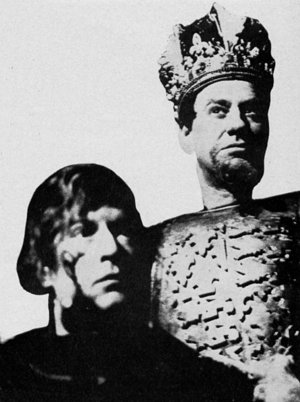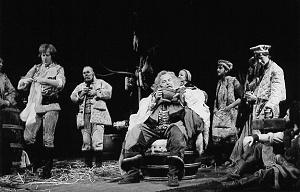The second production in the RSC's splendid triad of Bolingbroke-Falstaff-Hal plays gets straight down to business. With the born-to-be-King Hal established by Henry V as the apex of this triangle, we now meet the angles on the base line that will pull him, the one to make him acute, the other obtuse (doomed), knowing that he comes out right in the end to which we have already been privy.
The felicities of this production are less of a piece than the dazzling unity of style Terry Hands and Farrah achieved for Henry V. Here both King and prince stray into scenes from which they are usually absent. From the first, Henry IV watches, soft-lit and chorus-like, from the back of the stage as Hal and Falstaff flirt - almost literally flirt - with self-indulgence. From his dallying, Hal strolls off, seeing Henry lambast the nobles who will turn against him, removed from his father yet linked as he circles the stage. The set-piece tavern scenes are played amongst a clutter of furnishings - a barrel-armchair palpably Sir John's, all sizes of barrels, a meat and game rack topped by a straw hogshead and a wooden structure that suggests step-ladder, barrel-chute and gable. Atop this latter, Henry observes, almost unspotted in brown habit like a friar, the wraith of kingship. Father and son are present for the tender scene between Mortimer and his wife, Henry on his perch, Hal hidden in a shadowy corner, drinking, listening.

